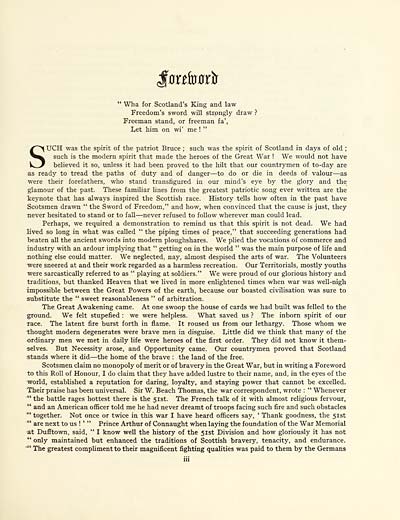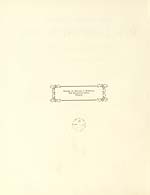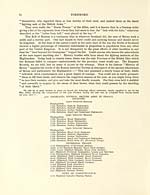Places > Morayshire roll of honour
(7) Page iii - Foreword
Download files
Complete book:
Individual page:
Thumbnail gallery: Grid view | List view

Sttttfootb
" Wha for Scotland's King and law
Freedom's sword will strongly draw ?
Freeman stand, or freeman fa',
I,et him on wi' me ! "
SUCH was the spirit of the patriot Bruce ; such was the spirit of Scotland in days of old ;
such is the modern spirit that made the heroes of the Great War ! We would not have
believed it so, unless it had been proved to the hilt that our countrymen of to-day are
as ready to tread the paths of duty and of danger — to do or die in deeds of valour — as
were their forefathers, who stand transfigured in our mind's eye by the glory and the
glamour of the past. These familiar lines from the greatest patriotic song ever written are the
keynote that has always inspired the Scottish race. History tells how often in the past have
Scotsmen drawn " the Sword of Freedom," and how, when convinced that the cause is just, they
never hesitated to stand or to fall — never refused to follow wherever man could lead.
Perhaps, we required a demonstration to remind us that this spirit is not dead. We had
lived so long in what was called " the piping times of peace," that succeeding generations had
beaten all the ancient swords into modern ploughshares. We plied the vocations of commerce and
industry with an ardour implying that " getting on in the world " was the main purpose of life and
nothing else could matter. We neglected, nay, almost despised the arts of war. The Volunteers
were sneered at and their work regarded as a harmless recreation. Our Territorials, mostly youths
were sarcastically referred to as " playing at soldiers." We were proud of our glorious history and
traditions, but thanked Heaven that we lived in more enlightened times when war was well-nigh
impossible between the Great Powers of the earth, because our boasted civilisation was sure to
substitute the " sweet reasonableness " of arbitration.
The Great Awakening came. At one swoop the house of cards we had built was felled to the
ground. We felt stupefied : we were helpless. What saved us ? The inborn spirit of our
xace. The latent fire burst forth in flame. It roused us from our lethargy. Those whom we
thought modern degenerates were brave men in disguise. Little did we think that many of the
ordinary men we met in daily life were heroes of the first order. They did not know it them-
selves. But Necessity arose, and Opportunity came. Our countrymen proved that Scotland
stands where it did — the home of the brave : the land of the free.
Scotsmen claim no monopoly of merit or of bravery in the Great War, but in writing a Foreword
to this Roll of Honour, I do claim that they have added lustre to their name, and, in the eyes of the
world, established a reputation for daring, loyalty, and staying power that cannot be excelled.
Their praise has been universal. Sir W. Beach Thomas, the war correspondent, wrote : " Whenever
" the battle rages hottest there is the 51st. The French talk of it with almost religious fervour,
" and an American officer told me he had never dreamt of troops facing such fire and such obstacles
**' together. Not once or twice in this war I have heard officers say, ' Thank goodness, the 51st
" are next to us ! ' " Prince Arthur of Connaught when laying the foundation of the War Memorial
at Dufftown, said, " I know well the history of the 51st Division and how gloriously it has not
" only maintained but enhanced the traditions of Scottish bravery, tenacity, and endurance.
"** The greatest compliment to their magnificent fighting qualities was paid to them by the Germans
iii
" Wha for Scotland's King and law
Freedom's sword will strongly draw ?
Freeman stand, or freeman fa',
I,et him on wi' me ! "
SUCH was the spirit of the patriot Bruce ; such was the spirit of Scotland in days of old ;
such is the modern spirit that made the heroes of the Great War ! We would not have
believed it so, unless it had been proved to the hilt that our countrymen of to-day are
as ready to tread the paths of duty and of danger — to do or die in deeds of valour — as
were their forefathers, who stand transfigured in our mind's eye by the glory and the
glamour of the past. These familiar lines from the greatest patriotic song ever written are the
keynote that has always inspired the Scottish race. History tells how often in the past have
Scotsmen drawn " the Sword of Freedom," and how, when convinced that the cause is just, they
never hesitated to stand or to fall — never refused to follow wherever man could lead.
Perhaps, we required a demonstration to remind us that this spirit is not dead. We had
lived so long in what was called " the piping times of peace," that succeeding generations had
beaten all the ancient swords into modern ploughshares. We plied the vocations of commerce and
industry with an ardour implying that " getting on in the world " was the main purpose of life and
nothing else could matter. We neglected, nay, almost despised the arts of war. The Volunteers
were sneered at and their work regarded as a harmless recreation. Our Territorials, mostly youths
were sarcastically referred to as " playing at soldiers." We were proud of our glorious history and
traditions, but thanked Heaven that we lived in more enlightened times when war was well-nigh
impossible between the Great Powers of the earth, because our boasted civilisation was sure to
substitute the " sweet reasonableness " of arbitration.
The Great Awakening came. At one swoop the house of cards we had built was felled to the
ground. We felt stupefied : we were helpless. What saved us ? The inborn spirit of our
xace. The latent fire burst forth in flame. It roused us from our lethargy. Those whom we
thought modern degenerates were brave men in disguise. Little did we think that many of the
ordinary men we met in daily life were heroes of the first order. They did not know it them-
selves. But Necessity arose, and Opportunity came. Our countrymen proved that Scotland
stands where it did — the home of the brave : the land of the free.
Scotsmen claim no monopoly of merit or of bravery in the Great War, but in writing a Foreword
to this Roll of Honour, I do claim that they have added lustre to their name, and, in the eyes of the
world, established a reputation for daring, loyalty, and staying power that cannot be excelled.
Their praise has been universal. Sir W. Beach Thomas, the war correspondent, wrote : " Whenever
" the battle rages hottest there is the 51st. The French talk of it with almost religious fervour,
" and an American officer told me he had never dreamt of troops facing such fire and such obstacles
**' together. Not once or twice in this war I have heard officers say, ' Thank goodness, the 51st
" are next to us ! ' " Prince Arthur of Connaught when laying the foundation of the War Memorial
at Dufftown, said, " I know well the history of the 51st Division and how gloriously it has not
" only maintained but enhanced the traditions of Scottish bravery, tenacity, and endurance.
"** The greatest compliment to their magnificent fighting qualities was paid to them by the Germans
iii
Set display mode to: Large image | Transcription
Images and transcriptions on this page, including medium image downloads, may be used under the Creative Commons Attribution 4.0 International Licence unless otherwise stated. ![]()
| Rolls of honour > Places > Morayshire roll of honour > (7) Page iii - Foreword |
|---|
| Permanent URL | https://digital.nls.uk/100233696 |
|---|---|
| Description | Arranged alphabetically by first-named place, starting with Aberdeen. |
|---|

